- Home
- Jack Gantos
Dead End in Norvelt Page 2
Dead End in Norvelt Read online
Page 2
2
I must have fallen asleep because I was dreaming of Pizarro’s crazed men melting down the golden statues of people into a big pot like when you melt a plastic army man over a burner on the stove when your mother isn’t looking. That’s when my alarm clock went off. It was five in the morning. I knew I had set it for six, but after I fell asleep Mom must have reset it. I was just going to roll over and go back to sleep when she tapped my shoulder and whispered, “Jack, are you awake?”
“I’m dreaming of gold,” I moaned. “Lots of gold.”
“Stop dreaming,” she ordered, and pinched my toe. “And hurry up. Miss Volker has probably made your breakfast already. She’s been up for hours.”
“I thought I was grounded,” I said nasally, and plucked out my bloodied nose plugs.
“I’m just loaning you to her for a while,” she explained. “When you finish with her come straight back home. Understand?”
I understood.
When she left I pulled on the same sweaty clothes I had peeled off the night before. I didn’t care that there were bloodstains spattered down the front of my shirt because every shirt I owned was decorated with bloodstains. I glanced at my hair in the mirror. My brown curls stood up on my head like a field planted with question marks. There was no reason to brush it. The question marks would just stand up into exclamation points and then wilt back over into question marks. Besides, I was a boy. It is okay to be a boy slob because moms think they still have time to cure you of your bad habits before you grow up and become an annoying adult slob for someone else.
“Change that nasty shirt,” Mom ordered when she spotted the crusty bib of dried blood across my chest.
I looked down at my shirt. “Hey, how come this blood is brown?” I asked. “Last night it was red.”
“It is too early in the morning to mess with me,” she replied. “Just change the shirt and get moving. I’m going back to bed.”
I didn’t change the shirt. Only a few spots of blood had soaked through, so I just turned it inside out as I walked down the narrow hall, past my small room, through the airless living room, and out the front door and down the three porch steps. All the Norvelt houses were built to look the same. It was like I was stepping out of one of those little green houses in a Monopoly game.
The dark grass was wet with morning dew and a little squeaky under my sneakers. It was tall enough for me to cut. I might be a slob but I kept the yard looking tidy because Dad allowed me to drive our big garden tractor with a mower attachment on the back. I’d love to drive a car, and just thinking of that word, drive, made me look toward the drive-in on the hill and wonder if the bullet I fired had passed cleanly over Norvelt and punctured the screen. From where I paused, the screen was a solid black square and I’d never know if I had hit that tiny Japanese soldier and put a hole in the screen unless I got up close to it, which I promised myself I would do before the summer was over.
Above the screen the western sky was still dark and the stars looked like holes from missed shots. It was a good thing John Glenn had orbited the earth back in February. If he’d still been up there last night I might have shot his Friendship 7 space capsule out of the air and started a world war. That would be just my luck. My uncle who had painted the pony claimed he had seen a UFO come down over that very same hill before the drive-in was built. He was in the newspaper and said he had “touched” the UFO and that it was “covered in a strange Martian language that looked like chicken feet.” My dad called my uncle a nut, but it wasn’t so nutty when the army sent troops and a big truck to take the mysterious UFO away and afterward military police went door-to-door to all the little towns around here, warning people not to talk about “the fallen object” with any strangers as they might be Russian spies.
Because my mind wanders in the morning my feet are always a few steps ahead of me and suddenly I found myself on Miss Volker’s back porch. There was a large heart-shaped box of chocolates covered in red foil leaning against her door. I bent down and picked up the box. A small note card was tucked under the decorative red lace ribbon. I knew I shouldn’t read it, but I couldn’t help myself. I loved to know other people’s personal business. Mom called me a gossip lover. But I called it whisper history, so as quickly as I could I pulled out the card and flipped it over. It was from Mr. Spizz. The handwriting was all chunky printing that leaned forward just like words blasting out of his mouth. It read, I’m still ready, willing and waiting. Your swain since 1912 with the patience of Job. —Edwin Spizz.
He was patient—1912 was fifty years ago. Waiting for what, I wondered. I didn’t know what a “swain” was. I put the card back into the envelope and slipped it under the ribbon. Mr. Spizz was with my uncle the night they found the UFO. Dad called him the town busybody. Mr. Spizz was an original Norvelter and worked for the Norvelt Association for the Public Good. He thought he was a big deal around town, but he was kind of sinister and lived and worked out of a tiny office in the moldy basement of the Community Center.
I rapped on Miss Volker’s door with my knuckles. “Miss Volker!” I called out loudly because her hearing aid might still be waterlogged from the toilet. “It’s Jack Gantos. I’m here to help you.”
“Come in!” she cawed like a pirate parrot.
I pushed the door to and stuck my head inside. “Hello?”
“In the kitchen,” she squawked.
I followed the smell of bacon and entered the kitchen where I was surprised to see her leaning over the gas stove with her hands inside a wide, tall pot and her face all screwed up in agony. I could tell by the leaf-size flames under the pot that it had to be scalding hot, and right away I was wondering if she was melting herself down. Mom had always said she was worth her weight in gold to our little town. But before I could start a conversation about Inca gold she said, “Sit and eat,” and nodded her stiff bush of bluish cotton-candy hair toward a chair at the kitchen table where a plate had been set with bacon, eggs, and toast.
“I found these chocolates on the porch,” I said, and offered her the box.
“Put them on the table!” she ordered without removing her hands from the pot.
“There is a card too,” I pointed out.
“You can just throw that in the trash!” she snapped.
“Trash?” I asked. “Don’t you want to know who it’s from?”
“It’s from the same hopeless case as always!” she said. “Now trash it!”
I tossed the card in the trash like she said. I put the chocolates on the table and when I sat down she began to talk as if someone were sticking her with sharp pins. “Thank you for coming!” she cried out, and did a spastic tippy-toe dance. “Today,” she squeaked, “we are about to embark on a great experiment!” Then she took a deep breath, shifted her hips around, and grimaced.
“What kind of experiment?” I asked fearfully, and stared at the pot where I was sure her hands were melting.
“Oh, gosh,” she said in a strained voice, and jerked her head back and stamped her thick old-lady shoe heels on the kitchen linoleum. “This is really, really scalding hot but let’s still keep talking and pretend like nothing at all is wrong.”
“Miss Volker,” I asked quietly, trying to be ridiculously calm like when doctors talk to insane people in the movies. I didn’t want her to snap and try and kill me like some psychotic lunatic. “You do realize that you are cooking your hands down in that big pot?”
“Of … course … I … do … dear,” she sputtered, and bit down on her lip and hissed as if her words were driven by steam. “Now … please … turn … it … off.”
I sprang out of my chair and twisted the knob on the stove and the flames doubled in size.
“Jeez Louise!” she shouted crossly. “I said off !”
“Whoops, sorry,” I apologized, and quickly turned the knob the other way.
“Agrhhh!” she cried out. “I think I may have really melted them this time.”
She lifted her hands out of the pot an
d they were melting. Lumps of glowing yellow flesh oozed down her forearms and spattered onto the floor.
“Oh mercy!” I cried, and fidgeted up and down like a terrified squirrel. “Miss Volker, what have you done to yourself?”
“Turn the cold water on over the sink!” she ordered. “I think I may have done permanent damage.”
I nearly flew to the sink and turned the spigot handle. “Give me your hands,” I said. “Quick.”
She stumbled toward me, then held out the sagging stumps of her melted arms. I hesitated, but there was nothing else to do except run away screaming, so I grabbed what I thought were her wrists. Oh cheeze! The warm, lifeless flesh squished between my fingers as I tugged her forward and held her ruined hands under the water.
She stamped the floor and groaned in horsey agony as her eyes rolled back into her head.
“You’ll be fine,” I jabbered about five jittery times in a row, and each time my mind echoed back, “You won’t be fine … you won’t ever be fine because you just melted your hands off !”
“Ahhh,” she sighed with a relaxed shudder, and after a moment her eyes leveled out. “That feels better,” she said calmly. “Now turn off the water.”
I did and she held her arms up. “Now peel it off,” she ordered.
“Peel what off?” I asked.
“The sticky stuff on my arms,” she said impatiently, and then she held a rounded stump up to her mouth, bit off a cooked chunk, and spit it into the trash.
I felt faint. I staggered back a few steps and by then my nose was spewing like an elephant bathing himself. “Please … Miss Volker,” I said with my voice quavering. “Please don’t eat your own flesh.” Oh cheeze-us-crust. Mom didn’t know Miss Volker had gone insane, and I knew I would go insane too if I had to watch her cannibalize her own body down to the white boiled bones.
“You’re bleeding all over the floor,” she said, turning her attention toward me as if she wanted to wash her flesh meal down with my blood. “Let me have a look at you.” Then she reached toward me with her deformed stumps and touched my face and at that moment I yelped out loud and dropped over dead.
* * *
When I came to I was alive and stretched out on Miss Volker’s kitchen floor. I was covered with blood but I didn’t know if it was nose blood or blood from after she started eating me. I lifted my head and turned it left and right to check if she had eaten through my neck. I was fine but she was standing above me and pulling long, rotten strips of flesh off her arms and hands as if peeling a rotten banana. She wadded them all up, leaned to one side, and dropped a ball into the large pot on the stove.
“Am I dead?” I asked. I felt dead.
“You fainted,” she replied. “And I fixed your nose.”
“You touched me?” I asked fearfully, and reached for my nose to see if it was still on my face.
“Yes,” she said. “After I got the wax off my fingers they were working okay so I folded some tissues into a wad and shoved them up between your upper lip and gum. That’s what stops a nosebleed.”
“You have fingers?” I asked, confused. I had seen them melt off like the Inca gold being melted down.
“Yes,” she said. “I’m human and I have fingers. They don’t work well because of my arthritis so I have to heat them up in a pot of hot paraffin in order to get them working for about fifteen minutes.”
“Hot what?”
“Hot wax,” she repeated impatiently. “You saw me doing it when you came in. Did that smack on your head when you hit the floor give you amnesia?”
I sat up and rubbed the lump on the back of my head. “I thought you were melting your fingers into gold,” I said. “I thought you had gone crazy.”
“I think you’ve gone crazy,” she replied. “You’re delusional. Now let’s not waste any more time. I have a deadline.”
“What are we doing?” I asked.
“Writing an obituary,” she revealed.
“Mine?”
“No! You are fine—you’re a spineless jellyfish, but not dead enough to bury. Now take a look at these hands,” she ordered, and thrust them in front of me. They were still bright red from the hot wax and curled over like the talons of a hawk perched on a fence. “I can’t write with them anymore,” she explained, “or do anything that requires fine motor skills. My twin sister used to write out the obituaries for me but her jug-headed idiot husband moved her to Florida last month. I was hoping he’d just have a spasm and drop dead and she would move in with me—but it didn’t work out that way. So you are now my official scribe. I got the idea from reading about President John Quincy Adams. He had arthritis too and when his hands gave out he had a young scribe who wrote for him. I’ll talk and you’ll write. You got that?”
“Sure,” I said, and then she caught me sneaking a peek at the glowing kitchen clock which was in the shape of a giant Bayer aspirin. It was six-thirty in the morning.
“That,” she said proudly, and aimed her chin at the clock, “was given to me by the Bayer Pharmaceutical Company after I gave out over a quarter million of their aspirin tablets to coal miners here in western Pennsylvania who suffered with back pain and splitting headaches.”
“That is a lot of pills,” I remarked, not knowing what else to say but the obvious.
“In nursing school,” she said, “I was taught by the doctors that the role of medical science is to relieve human suffering, and I’ve lived by that motto all my life.”
“What about your hands?” I said, pointing up at them.
“Someday science will solve that. But for now, get up off the floor,” she ordered. “We’ve got to get this obit to the newspaper in an hour so Mr. Greene can print it for tomorrow morning’s edition.”
I stood all the way up and staggered into the living room.
“There’s your office,” she said, and pointed a shiny red hand toward an old school desk and matching chair. “Lift the top.”
I did. There were several pads of lined paper and a bundle of sharpened pencils held together with a rubber band.
“I’ll talk, and you write,” she explained, setting the rules. “If I talk too quickly then you just tell me and I’ll slow down. You got it?”
“Yeah,” I said. I was really ready to do anything that would clear my head from thinking about this old lady melting her flesh in a kitchen pot.
Miss Volker stood by the fireplace mantel and took a breath so deep it straightened out her curved spine.
“Emma Devers Slater,” she started, and sharply enunciated each flinty syllable as if she were using a hammer and chisel to phonetically carve the dead woman’s name onto a stone crypt, “was born on Christmas day, 1878, and died on June 15, 1962, while attending to her prize honeybees, which were once essential for pollinating crops at Norvelt’s community farm. She and her husband were original members of the two hundred and fifty families that started the Homestead of Norvelt in 1934, occupying house A-38, a two-bedroom model.
“The Slater family, which she married into, is an old name in these parts and famous for offspring with extremely hard heads. I remind the reader of the true story of the Slater ‘girl’ who was captured by Indians in the 1830s, knocked unconscious with a war club and scalped with a knife, but still managed to abscond with her life and survive hairlessly to live to a ripe old age beneath a wig made of curly hamster fur.
“And who can forget Emma Slater’s brother-in-law, Frederick, who was tamping an explosive charge into a coal vein with a metal rod when the charge accidentally exploded and propelled the rod up through his cheek and clean out the top of his head? He survived and lived a long life as a traveling medical-miracle circus attraction and made money by charging people a dime to stick their finger into the damp hole in his head. Frederick married another circus attraction who when she was a girl had a piece of white picket fence driven through her upper torso during the great Johnstown Flood of 1889.
“Emma Slater is survived by four loving children who grew up in Norvelt, bu
t none of them live in town any longer, having left to find jobs. Her husband, Herbert Mark Slater, passed away twenty-three years prior from black lung disease after working in the mines at Mutual Shaft all his life except during his military service in World War I and the Great Depression years when the mines were closed. Mrs. Slater belonged to the Mothers’ Club of Norvelt, the Fancy Hat Club, and the Lutheran Church.
“We are grateful for her community service, especially her years as a school crossing guard where she was much loved by children. An open viewing and memorial service will be held at the Oscar Huffer Funeral Parlor next Friday from six until nine in the evening followed by a potluck buffet at the Community Center, where her exceptional needlepoint portrait of our town’s esteemed founder, Eleanor Roosevelt, will be on display.”
Then she bowed her head, closed her eyes, and quietly said a little prayer for Mrs. Slater.
By the time she opened her eyes I had put my pencil down. “Is that it?” I asked, and caught myself panting as if I’d run a marathon. My hand was feeling as cramped as hers looked.
“No,” she replied, “but you can take a break. That’s just the family part I have to write. I’ve done the best I can for Mrs. Slater. Writing obits is doing my duty for Mrs. Roosevelt, but it also allows me to write things that people wouldn’t normally read around here. I guess you could say the obits are the honey to attract readers. Now here is the part I want to write, so stretch your fingers and get your pencil revved up—people may die but we’ve got some important ideas to keep alive.”
Then she awkwardly palmed a small history book with one hand and raised it into the air. Her twisted fingers looked like the rough old roots of a tree that had grown around a clay brick. She puffed herself up like a tent preacher and began to belt out the other half of the story.

 Jack Adrift
Jack Adrift Jack's New Power
Jack's New Power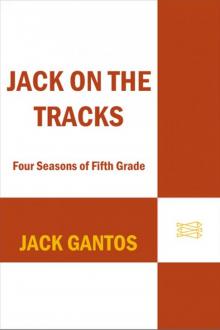 Jack on the Tracks
Jack on the Tracks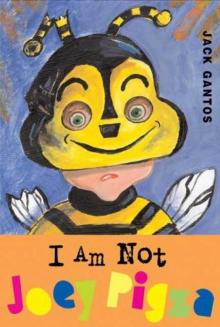 I Am Not Joey Pigza
I Am Not Joey Pigza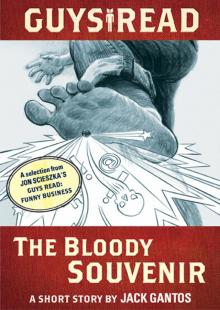 The Bloody Souvenir
The Bloody Souvenir Joey Pigza Loses Control
Joey Pigza Loses Control Heads or Tails
Heads or Tails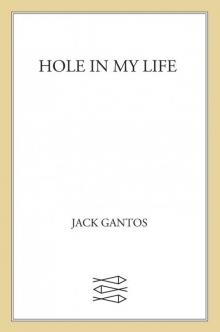 Hole in My Life
Hole in My Life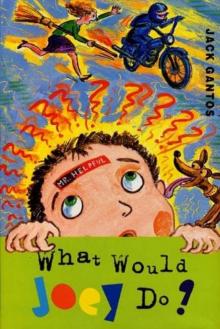 What Would Joey Do?
What Would Joey Do?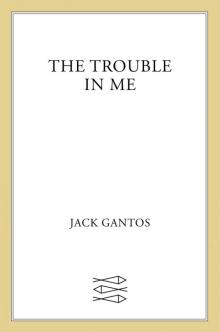 The Trouble in Me
The Trouble in Me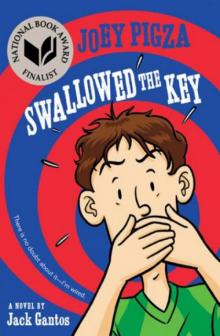 Joey Pigza Swallowed the Key
Joey Pigza Swallowed the Key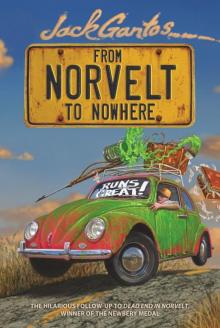 From Norvelt to Nowhere (Norvelt Series)
From Norvelt to Nowhere (Norvelt Series)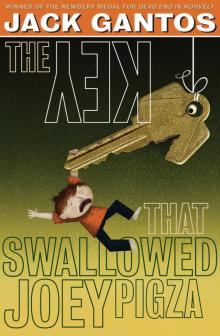 The Key That Swallowed Joey Pigza
The Key That Swallowed Joey Pigza Jack's Black Book
Jack's Black Book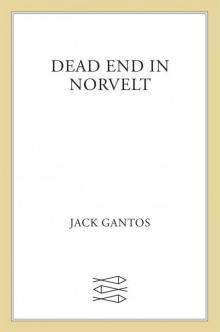 Dead End in Norvelt
Dead End in Norvelt